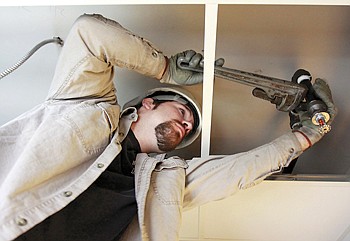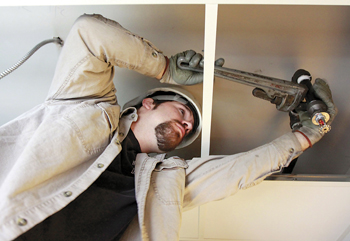The city could shut down dozens of local businesses at the end of 2012, including the Station House restaurant at the Chattanooga Choo-Choo, if owners do not install costly sprinkler systems, according to a new code the City Council is considering.
The rule change, backed by Chattanooga Fire Marshal James Whitmire, requires that existing sports bars, restaurants with live entertainment, dance halls, discotheques, nightclubs and "assembly occupancies with festival seating" install sprinkler systems. The cost is $2 to $12 per square foot, or an average of $50,000 to $70,000 per business with an occupancy over 100, officials say.
The City Council on Tuesday night deferred action on the code for two weeks to allow the city attorney's office time to set a definition of "nightclubs" affected by the ordinance.
Matt Lewis, co-owner of the new Honest Pint on Patten Parkway, said he would have canceled plans to open the restaurant if he, rather than the owner, had been forced to pay for the Honest Pint's $60,000 sprinkler installation.
"We would have walked away if they had made us do that," he said.
Some City Council members worry the new regulations could be "a real hardship" on business owners.
"On the new buildings, I can understand, but with the old buildings that's a lot of hardship they're going to put on them in this economy," Councilman Jack Benson said. "We've got to see how necessary this is and only do what's absolutely necessary."
Manny Rico, chairman of the City Council, said the measure was a "no brainer."
"If it affects even one of my businesses, I don't want that," he said.
Capt. Seth Miller, who presented the fire marshal's plan to the City Council and a variance board meeting, was at a loss to name a nightclub fire in Chattanooga that had killed patrons.
"I can't remember one," Miller said.
Nor could Whitmire, who was appointed in October. He said the office is "being proactive."
"What's the dollar value of a human life?" he asked.
As evidence of the danger, the fire marshal's office distributed a handout listing recent nightclub fires in Russia, Thailand and China.
Miller also presented a video to the City Council of the Rhode Island nightclub fire that killed 100 people eight years ago. He said the fire at The Station club there would have been far less deadly had sprinklers been installed.
Just the possibility of such a fire occurring in Chattanooga is enough to warrant the new rule, argued Deputy Chief Lamar Flint, who served as interim fire marshal before Whitmire.
"The safety of individuals far outweigh the cost, and that's the perspective of our office," Flint said.
CODE COST
Deadliest U.S. public assembly and nightclub fires:• Iroquois Theater, Chicago; Dec. 30, 1903; Deaths: 602• Cocoanut Grove nightclub, Boston; Nov. 28, 1942; Deaths: 492• Conway's Theater, Brooklyn, N.Y.; Dec. 5, 1876 Deaths: 285• Rhythm Club dance hall, Natchez, Miss.; April 23, 1940; Deaths: 207• Rhoads Opera House, Boyertown, Pa.; Jan. 13, 1908; Deaths: 170• Ringling Brothers and Barnum & Bailey circus tent, Hartford, Conn.; July 6, 1944; Deaths: 168• Beverly Hills Supper Club, Southgate, Ky.; May 28, 1977; Deaths: 165• The Station nightclub, West Warwick, R.I.; Feb. 20, 2003; Deaths: 100• Happy Land Social Club, Bronx, N.Y.; March 25, 1990; Deaths: 87• Richmond Theater, Richmond, Va.; Dec. 26, 1811; Deaths: 72
Under the current code, new or significantly renovated buildings are required to upgrade their fire safety systems to meet minimum standards.
The new code proposed by Whitmire upgrades the sprinkler requirements to cover all "A2 assembly occupancy" buildings, even those with no new renovations or changes of use.
"In a new building, it's not that hard to do. In an old building it's a much tougher process," said Bill Mish, chairman of the board of the Tennessee Hospitality Association.
It's also a more expensive process.
Joe Sliger of Eastman Construction said it would be a "deal breaker" for some of the buildings he owns.
"If the installation costs more than the building is worth, I'd be better off shutting it down," Sliger said.
The new code essentially would give the fire marshal absolute power to decide who stays in business and who goes bankrupt, he added, which would be unfair if it were not uniformly enforced.
"I don't think there has ever been any kind of revised building code that applied to existing buildings where no other work has been done," Sliger said.
Sliger's company worked on renovating the former Brass Register on Georgia Avenue into a Jefferson's sports bar. Building co-owner Fred Robinson said the unexpected addition of a sprinkler system almost stopped the renovation process entirely.
The bill came to $65,400, not including electrical components, he said.
"If some of these out-of-the-way, low-volume locations have to meet [sprinkler requirements], it's going to make the building worth nothing as a restaurant, or cause them to change the use or drop the alcohol," Robinson said.
At the City Council meeting Tuesday, Luken Construction's Russ Elliott expressed worry about the effect of creeping regulation on that company's extensive office holdings, which officials claimed would not be affected by the ordinance.
"My worry is that this may boomerang around and hit other occupancies," Elliott said, though officials assured him that was not the case.
THE STATION
Speaking to the City Council, Miller emphasized the tragedy of the fire at The Station nightclub in Rhode Island, noting the speed with which it spread and the relative ease with which it could have been prevented.
He showed those in attendance an unedited video of the event, a graphic film that shows the fire engulfing the wooden building and 100 patrons within minutes.
Fire officials contend the disaster could have been prevented or lessened with a properly installed sprinkler system, among other measures.
But Chattanooga's current code, which requires sprinklers to be installed when the building's use changes, also could have prevented the loss of life at The Station, according to Rhode Island fire officials.
Michael DiMascolo, deputy chief fire marshal of the state of Rhode Island, said The Station was supposed to install sprinklers when it changed from a restaurant to a nightclub, but fire marshals did not force it to do so because of a grandfather clause.
Robert Duval, regional manager for the National Fire Protection Association, agreed that without Rhode Island's grandfather clause, The Station nightclub fire shown to council members would have been stopped under Chattanooga's current rules.
Chattanooga has no grandfather clause that would stop local officials from enforcing the current code, Whitmire said, other than his proposed two-year moratorium on enforcement.
COMPROMISE
Though some business owners would like to see a compromise, with more time for meeting the new code, Whitmire said that "the compromise is the two-year time frame we're giving them."
"He could have insisted that this be done immediately," noted Flint.
In Nashville, when similar regulations drew an initial outcry, city officials expanded the time frame to three years and upped occupancy requirements to 200, instead of the 100 proposed for Chattanooga.
"That was their choice to make on that end," Flint said. "We chose to go by what the professionals said, the people who sat down and reviewed these incidents throughout the country and the world."
But some professionals appear to come to different conclusions, said Robinson.
He cited a 2010 NFPA report that showed an average of only three deaths per year from fires that occur in eating and drinking establishments nationwide, in the period from 2004 through 2008.
The U.S. experienced an annual average of 8,520 structure fires in "eating and drinking establishments, which make up only 1.6 percent of all reported structure fires within the same time period," according to the report.
Sliger said the two-year time frame and the cost of installation mean some businesses simply may not survive the code changes.
And Mish, from his experience in the hospitality industry, added that profit margins in the restaurant industry "despite what people think, aren't that great. Every penny counts."
Gary Hilbert, head building inspector and director of the Chattanooga Land Development Office, said there would be a limited amount of flexibility for compliance. But, he said, "each business owner is going to have to evaluate this, and say, 'Is it worth it or do I just close this business down and go do something else?' It's going to have to be a business decision."
Hilbert said there is nothing better than sprinklers for giving patrons time to get out of a burning building and limiting smoke damage. And when safety is at stake, cost should be no object, he said.
However, business owners said public officials don't think like private businessmen, for whom every cost is, by necessity, of great concern.
"A big issue like that, which could literally shut a business down, everybody has to get together and make sure there's lots of public input, and make sure everyone has time to do research and respond," said Greg Adkins, executive director for the Tennessee Hospitality Association.
Safety is important, he said, "but you don't want to put businesses out of business. You don't want to put them in an employment line when we're in a fragile recovery."

